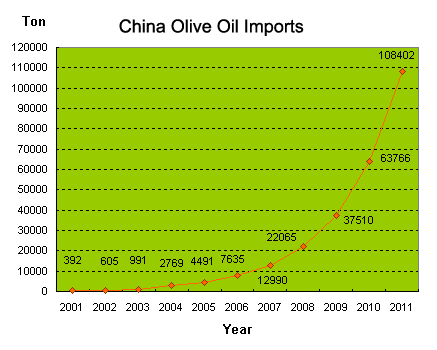China is taking a great leap forward with its olive and olive oil production and Spain is being urged to get onboard or see Italy or Israel take the lead.
The Chinese Government is reported to be planning a 500 percent increase in its current 33,000 – 40,000 hectares of olive groves in the next five years with the plantation of 160,000 hectares in the Himalayas, close to Tibet.
Polytechnic University of Madrid professor María Gómez de Campo sees it as a big chance for Spanish companies to offer their expertise and technology. Rather than fear market loss, they should position themselves in the market, “because China is already in contact with Italian and Israeli experts,” she said.
According to EFEAgro, Spain is currently China’s main supplier in terms of volume of olive oil but Italy leads in trade value.
China already has some olive groves, principally in Sichuan, Gansu and Hubei. In the 60s, olive trees were imported from Albania and Russia, mainly of the “Berat” variety.
Gómez de Campo said that the Chinese government wanted to expand its olive sector to try to provide a living for rural residents, hence reducing mass migration to cities, and also for environmental reasons, such as reducing soil erosion on steep mountain slopes.
She said the expansion was likely to be profitable but with low yields and challenged by an adverse climate, with wet summers being a particular problem in some zones. Given its massive population, China was unlikely to ever achieve self-sufficiency in the sector, she said.

The International Olive Council (IOC) estimated that by 2020, 160 million Chinese households will have the purchasing power to buy olive oil, with many consumers increasingly influenced by Western trends and having a greater interest in healthy nutrition than in other markets.
Meanwhile, during Expoliva last week a Moroccan olive oil delegation was in Jaén as part of a technological cooperation visit organized by the Innovation and Development Agency of Andalusia (IDEA). The group learned about organizations including the the CITOLIVA Technological Center in Jaén, which develops and promotes innovation in the olive oil industry, and delegation member Abdelilah Saidi, director of the Moroccan financial institution Credit Agricole de Maroc, spoke about the Agropolis project in his country, which is designed to improve the competitiveness of agribusiness in the strategic region of Meknes.
According to IOC forecasts, Morocco will double its olive oil production to 150,000 tons in 2010-11.








